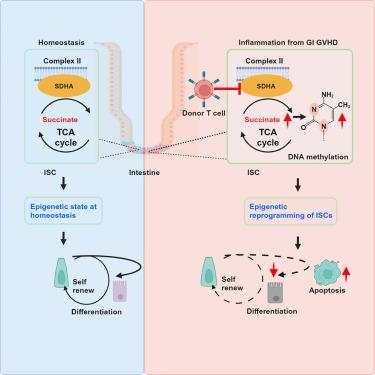当前位置:
X-MOL 学术
›
Cell Stem Cell
›
论文详情
Our official English website, www.x-mol.net, welcomes your
feedback! (Note: you will need to create a separate account there.)
Inflammation-induced epigenetic imprinting regulates intestinal stem cells
Cell Stem Cell ( IF 19.8 ) Pub Date : 2024-09-03 , DOI: 10.1016/j.stem.2024.08.006 Dongchang Zhao 1 , Visweswaran Ravikumar 2 , Tyler J Leach 1 , Daniel Kraushaar 1 , Emma Lauder 3 , Lu Li 1 , Yaping Sun 1 , Katherine Oravecz-Wilson 4 , Evan T Keller 5 , Fengju Chen 1 , Laure Maneix 1 , Robert R Jenq 6 , Robert Britton 1 , Katherine Y King 1 , Ana E Santibanez 1 , Chad J Creighton 1 , Arvind Rao 2 , Pavan Reddy 3
Cell Stem Cell ( IF 19.8 ) Pub Date : 2024-09-03 , DOI: 10.1016/j.stem.2024.08.006 Dongchang Zhao 1 , Visweswaran Ravikumar 2 , Tyler J Leach 1 , Daniel Kraushaar 1 , Emma Lauder 3 , Lu Li 1 , Yaping Sun 1 , Katherine Oravecz-Wilson 4 , Evan T Keller 5 , Fengju Chen 1 , Laure Maneix 1 , Robert R Jenq 6 , Robert Britton 1 , Katherine Y King 1 , Ana E Santibanez 1 , Chad J Creighton 1 , Arvind Rao 2 , Pavan Reddy 3
Affiliation

|
It remains unknown whether and how intestinal stem cells (ISCs) adapt to inflammatory exposure and whether the adaptation leaves scars that will affect their subsequent regeneration. We investigated the consequences of inflammation on Lgr5+ ISCs in well-defined clinically relevant models of acute gastrointestinal graft-versus-host disease (GI GVHD). Utilizing single-cell transcriptomics, as well as organoid, metabolic, epigenomic, and in vivo models, we found that Lgr5+ ISCs undergo metabolic changes that lead to the accumulation of succinate, which reprograms their epigenome. These changes reduced the ability of ISCs to differentiate and regenerate ex vivo in serial organoid cultures and also in vivo following serial transplantation. Furthermore, ISCs demonstrated a reduced capacity for in vivo regeneration despite resolution of the initial inflammatory exposure, demonstrating the persistence of the maladaptive impact induced by the inflammatory encounter. Thus, inflammation imprints the epigenome of ISCs in a manner that persists and affects their sensitivity to adapt to future stress or challenges.
中文翻译:

炎症诱导的表观遗传印记调节肠道干细胞
目前尚不清楚肠道干细胞(ISC)是否以及如何适应炎症暴露,以及这种适应是否会留下影响其随后再生的疤痕。我们在急性胃肠道移植物抗宿主病 (GI GVHD) 明确的临床相关模型中研究了炎症对 Lgr5 + ISC 的影响。利用单细胞转录组学以及类器官、代谢、表观基因组和体内模型,我们发现 Lgr5 + ISC 经历代谢变化,导致琥珀酸的积累,从而重新编程其表观基因组。这些变化降低了 ISC 在连续类器官培养物中离体分化和再生的能力,以及连续移植后体内的分化和再生能力。此外,尽管最初的炎症暴露得到了解决,但 ISC 的体内再生能力却下降,这表明炎症遭遇引起的适应不良影响仍然存在。因此,炎症以一种持续存在的方式给ISCs的表观基因组留下印记,并影响它们适应未来压力或挑战的敏感性。
更新日期:2024-09-03
中文翻译:

炎症诱导的表观遗传印记调节肠道干细胞
目前尚不清楚肠道干细胞(ISC)是否以及如何适应炎症暴露,以及这种适应是否会留下影响其随后再生的疤痕。我们在急性胃肠道移植物抗宿主病 (GI GVHD) 明确的临床相关模型中研究了炎症对 Lgr5 + ISC 的影响。利用单细胞转录组学以及类器官、代谢、表观基因组和体内模型,我们发现 Lgr5 + ISC 经历代谢变化,导致琥珀酸的积累,从而重新编程其表观基因组。这些变化降低了 ISC 在连续类器官培养物中离体分化和再生的能力,以及连续移植后体内的分化和再生能力。此外,尽管最初的炎症暴露得到了解决,但 ISC 的体内再生能力却下降,这表明炎症遭遇引起的适应不良影响仍然存在。因此,炎症以一种持续存在的方式给ISCs的表观基因组留下印记,并影响它们适应未来压力或挑战的敏感性。






























 京公网安备 11010802027423号
京公网安备 11010802027423号